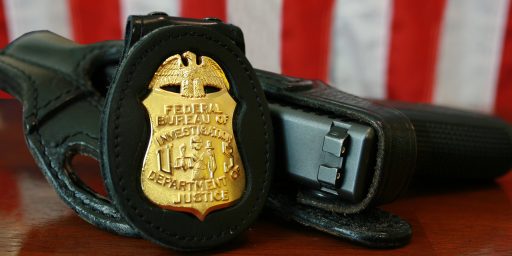4TH AMENDMENT, R.I.P.
In a week where the Supreme Court validated severe curtailment of the 1st Amendment by the elected branches, WaPo reports we are further eroding the already threadbare 4th:
The FBI has implemented new ground rules that fundamentally alter the way investigators handle counterterrorism cases, allowing criminal and intelligence agents to work side by side and giving both broad access to the tools of intelligence gathering for the first time in decades.
The result is that the FBI, unhindered by the restrictions of the past, will conduct many more searches and wiretaps that are subject to oversight by a secret intelligence court rather than regular criminal courts, officials said. Civil liberties groups and defense lawyers predict that more innocent people will be the targets of clandestine surveillance.
The new strategy — launched in early summer and finalized in a classified directive issued to FBI field offices in October — goes further than has been publicly discussed by FBI officials in the past and marks the final step in tearing down the legal wall that had separated criminal and intelligence investigations since the spying scandals of the 1970s, authorities said.
Senior FBI officials said the changes have already helped the bureau disrupt plans for at least four terrorist attacks overseas and uncover a terrorist sleeper cell in the United States, though they declined to provide details on those cases. The approach also has resulted in a notable surge in the number of counterterrorism investigations, a statistic that is classified but currently stands at more than 1,000 cases, officials said.
“With 9/11 as the catalyst for this, what we’ve done is fundamentally change the approach we take to every counterterrorism case,” FBI terrorism chief John S. Pistole said in an interview. “This is a sea change for the FBI.”
To civil libertarians and many defense lawyers, the changes pose a threat to the privacy and due-process rights of civilians because they essentially eliminate, rather than merely blur, the traditional boundaries separating criminal and intelligence investigations. As a result, these critics say, FBI agents and federal prosecutors will conduct many more searches and seizures in secret, as allowed under intelligence laws, rather than being constrained by the rules of traditional criminal warrants.
“By eliminating any distinction between criminal and intelligence classifications, it reduces the respect for the ordinary constitutional protections that people have,” said Joshua L. Dratel, a New York lawyer who has filed legal briefs opposing government anti-terrorism policies. “It will result in a funneling of all cases into an intelligence mode. It’s an end run around the Fourth Amendment,” which protects citizens from unreasonable searches, he said.
According the the unedited version, the 4th says:
The right of the people to be secure in their persons, houses, papers, and effects, against unreasonable searches and seizures, shall not be violated, and no Warrants shall issue, but upon probable cause, supported by Oath or affirmation, and particularly describing the place to be searched, and the persons or things to be seized.
Sadly, this rather simple declaration has more exceptions than any other of our fundamental rights, as this FindLaw “annotated” version shows. Given that fighting terrorism is almost certainly a better rationale than preventing the appearance of corruption–which justified the Court’s upholding of McCain-Feingold–this further erosion of the right against warrantless searches will almost certainly be upheld. Depending on Sandra Day O’Connor’s mood on the day it reaches the Court, of course.






You blame this on Sandra Day O’Connor.
I would remind you that this crap is being pushed by the same people that would replace her with a judge who would rubber stamp more erosions of our liberty.
That would be our current president – Mr. Bush.
It could stop tomorrow with the rollback of the Patriot Act – don’t bet on it!!!!!
I’m not blaming the inclination of the executive to get over-enthusiastic in law enforcement on the courts; I only blame them for not reigning in the excess.
The true threat to the Fourth Amendment isn’t O’Connor, it’s Rhenquist. In most cases, the Chief Justice is quite reasonable – not exactly a strict constructionist, but definitely concerned with original intent. But since the advent of the War on (Some) Drugs, the Fourth Amendment opinion on a drug case authored by Rhenquist that didn’t water down Fourth Amendment protections has been the rarest bird in the jurisprudential world.
On a side note: Mark is full of it. The whole problem with O’Connor is that she all too often enggages in just the kind of meandering, disconnected-from-the-text exegeses that characterized the CFR opinion. That’s what *liberal* judges do, because that’s how you use “Constitutional interpretation” to reshape the law in your own image.
Bush is unlikely to appoint any such meanderers. A strict constructionist will not “rubber stamp more erosions of our liberty.” Of course, neither will a strict constructionist rubber stamp novel new legal theories that find new and previously undiscovered “rights” in a 200+ year-old document. That’s really the problem liberal have with them, now isn’t it?
One cautionary note before everyone heads off into hyperspace on this: without actually having the text of the directive(s), you don’t know what you’re really talking about. Specifically, it has historically been considered acceptable for the Intelligence Community to collect information on U.S. soil about persons acting on behalf of a foreign power–while that generally refers to state actors, Al Qaeda and others could reasonably be considered foreign. Further, policy has long considered the possibility that information collected for intelligence purposes might have legitimate law enforcement use.
For example, say an Air Force reconnaissance aircraft conducting a training mission obtains an image of a military base, plus a small amount of the surrounding town. The image was collected for a perfectly reasonable purpose–training–and was not collected with any consideration to obtain information about any U.S. person. Now, for the sake of argument, say the FBI is looking for a missing person who may have been killed and buried in an area near the base. It would not generally be legal to take new collection actions on the basis of the FBI need, but if there is previously collected information available, it can be provided just like surveillance technology (say, an infrared camera or improved “bug”) as a tool to support law enforcement.
The Washington Post is a fine newspaper, but even its supposedly “expert” reporters often have only the barest hint of a clue about military and intelligence matters.
Jem,
Read the direct quotes from FBI officials who went on the record cited in the piece–indeed, even quoted in my post. This is well beyond sharing evidence collected in good faith with law enforcement; this is using the cover of anti-terrorism law to get around the 4th Amendment.
—